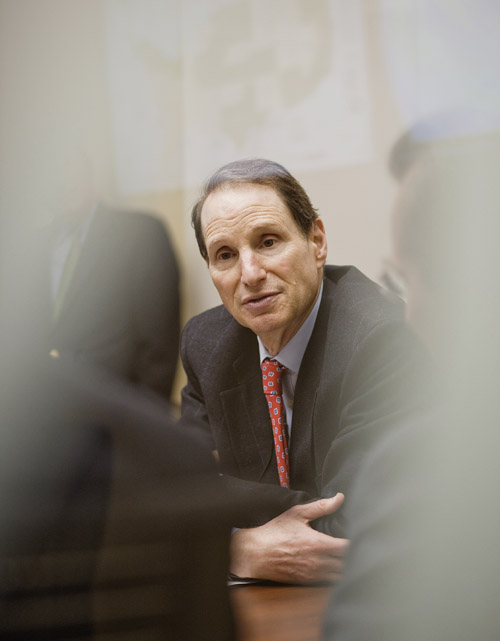 BY LINDA BAKER
BY LINDA BAKER
Sen. Ron Wyden takes reins at Senate Finance Committee.
 |
| //Photos by Carl Kiilsgaard |
BY LINDA BAKER
It’s a Friday afternoon in late February, and Sen. Ron Wyden, a week into his new job as chair of the Senate Finance Committee, has just flown into Portland from Washington, poised for a weekend of town halls around the state. “I’m kind of curious about how people will respond to the news,” he says, offering up a hypothetical question from the people. “‘So Ron’s chairman of the Senate Finance Committee; can he get me a 3% home loan?’ A big part of my job now is walking people through how this really works.”
With jurisdiction over taxes, trade and federal entitlement programs like Medicare, the Senate Finance Committee is widely considered one of the most powerful in Congress: a gatekeeper for legislation affecting every American. Known for his wonky enthusiasm on all manner of issues, Wyden, 64, has toiled for years on complex big-picture regulations and reforms that often seemed impossible to implement. Now Oregon’s senior senator has the bully pulpit and the resources to help turn grand ideas into action. “It’s going to be a very activist operation,” Wyden says. “The key is going to be strong bipartisan support.”
In a phone interview with Oregon Business, Wyden offered a glimpse of his plans for the committee. Tax reform is a priority, but with the Republican leadership focused on Obamacare, Wyden says, “we have to make this a two step approach.” Step one is renewing about 50 tax credits that expired in 2013, including deductions for state and local sales taxes, research and development, and renewable energy. “We then have to use the extenders as a springboard to comprehensive reform,” Wyden says.
It’s a project, he likes to say, in which he has invested “a lot of sweat equity.” In 2010, Wyden introduced the Bipartisan Tax Fairness and Simplification Act, a bill co-sponsored by Judd Gregg, the former Republican senator from New Hampshire. (“He and I sat on the sofa almost every week for two years. Both of us felt we were going to walk out 15 times. We stayed put.”) That hard-fought legislation languished, but Wyden’s comprehensive tax-reform package uses the 2010 bill as a model. In broad parameters, the plan would simplify the tax code, reduce individual and corporate tax rates, and narrow the gap on taxation between investment and earned income by boosting capital gains and dividends rates.
Support for the middle class is a recurring theme in Wyden’s rhetoric about taxes — and trade policy. A liberal Democrat known for partnering with GOP colleagues, Oregon’s senior senator has been a consistent supporter of free-trade agreements such as the North American Free Trade Agreement with Canada and Mexico (NAFTA). He also has close ties to outdoor-apparel manufacturers — Nike, Columbia Sportswear — and has sponsored bills eliminating tariffs on recreational clothing. But instead of green-lighting the latest plans to speed trade deals — including a fast track plan known as the Trade Promotion Authority, and a 12-nation trade pact, the Trans-Pacific Partnership — Wyden now urges caution.
“We have a lot of issues to work though,” he says, namely, ensuring such deals don’t lead to a loss of manufacturing jobs at home. “Many folks hear the words ‘trade agreement’ and say it means more jobs in the front office, but what does it mean for the middle class that is hurting — the people who take a shower in the office?” asks Wyden. “Trade done right is very significant to the Oregon economy. But we need to expand the winner’s circle on these agreements.”
 Spreading the wealth in the international commerce arena is one goal. Aligning trade policy with an increasingly tech-driven economy is another. Back in 1996, Wyden observes, he successfully introduced an amendment preventing Internet providers from being held liable for content posted on their sites. “Section 230 of the Communications Decency Act,” he says. “It created the legal foundation for 21st-century social media. Twitter, social media — I wrote the law that made it possible for them to invest.”
Spreading the wealth in the international commerce arena is one goal. Aligning trade policy with an increasingly tech-driven economy is another. Back in 1996, Wyden observes, he successfully introduced an amendment preventing Internet providers from being held liable for content posted on their sites. “Section 230 of the Communications Decency Act,” he says. “It created the legal foundation for 21st-century social media. Twitter, social media — I wrote the law that made it possible for them to invest.”
Taking credit for the rise of social networking companies may sound a bit like Al Gore taking credit for the Internet. But 18 years post-CDA, Wyden is considered something of a digital-commerce policy expert; when he talks about tech issues, tech leaders listen — and applaud. In 2012 he led the successful crusade to block the Stop Online Piracy Act (SOPA), considered by many a threat to the basic structure of the Internet. Likewise, the Digital Trade Act, a bill he introduced in December with Sen. John Thune (R-S.D.) — “I’m very pleased with the bipartisan bill” — is intended to preserve a free flow of data across borders. “We need to bring trade policy in line with the times,” Wyden says.
{pullquote} Trade done right is very significant to the Oregon economy. But we need to expand the winner’s circle on these agreements. {/pullquote}
Health care is another area where Wyden’s chairmanship will likely have a big impact — with Medicare reform in particular. “Any discussion of budget challenges has to take on Medicare; it has critical implications for the next generation,” says Wyden, whose wife, Nancy Bass, gave birth to their third child last year: Scarlett Willa Wyden. What’s it like parenting a 1-year-old at age 64? “Just the best!” says the exuberant father, who, with Bass, also has 6-year-old twins.
In January Wyden introduced the Better Care, Lower Cost Act of 2014, a measure cosponsored by Sen. Johnny Isakson (R-Ga) and two House members. Resembling Oregon’s pioneering coordinated care model for Medicaid, the proposal would shift senior care from a fee-per-service payment system toward a single payment based on doctors and nurses working to integrate care for people with chronic illness.
The new structure may also benefit Oregon health care providers, who have long complained about the state’s low Medicare reimbursement rates; under the BCLC, that disadvantage would be mitigated.
Along with trade legislation, tax extenders and Medicare, Wyden has plenty of other unfinished business on his plate, including a Highway Trust Fund projected to run out of money this year and a controversial plan to boost timber harvests on Oregon’s federal forests, the lands once owned by the former O&C Railroad.
If the state’s history is a predictor of future success, Wyden’s chances of moving the needle on major policy issues may be better than it seems — contentious political environment notwithstanding. The last Oregonian to be Senate Finance Chair was Bob Packwood, the man Wyden replaced when Packwood resigned over sexual harassment and ethics charges. Packwood helped write a sweeping 1986 tax-reform package — the last major overhaul of federal tax law in the United States.
“We’ve been able to show on the big stuff that it’s possible to block things,” says Wyden. “Now the question is can you turn that around and get stuff passed. I’m very optimistic that we can.” And how does it feel to hold one of the most coveted committee chairmanships in the Senate? Wyden responds in character: “It’s an enormous thrill.”

